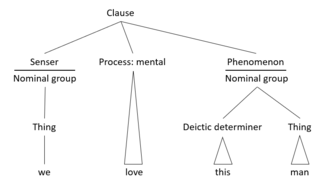Related Research Articles

Functional linguistics is an approach to the study of language characterized by taking systematically into account the speaker's and the hearer's side, and the communicative needs of the speaker and of the given language community. Linguistic functionalism spawned in the 1920s to 1930s from Ferdinand de Saussure's systematic structuralist approach to language (1916).
Adele Eva Goldberg is an American linguist known for her development of construction grammar and the constructionist approach in the tradition of cognitive linguistics.
Construction grammar is a family of theories within the field of cognitive linguistics which posit that constructions, or learned pairings of linguistic patterns with meanings, are the fundamental building blocks of human language. Constructions include words, morphemes, fixed expressions and idioms, and abstract grammatical rules such as the passive voice or the ditransitive. Any linguistic pattern is considered to be a construction as long as some aspect of its form or its meaning cannot be predicted from its component parts, or from other constructions that are recognized to exist. In construction grammar, every utterance is understood to be a combination of multiple different constructions, which together specify its precise meaning and form.
Principles and parameters is a framework within generative linguistics in which the syntax of a natural language is described in accordance with general principles and specific parameters that for particular languages are either turned on or off. For example, the position of heads in phrases is determined by a parameter. Whether a language is head-initial or head-final is regarded as a parameter which is either on or off for particular languages. Principles and parameters was largely formulated by the linguists Noam Chomsky and Howard Lasnik. Many linguists have worked within this framework, and for a period of time it was considered the dominant form of mainstream generative linguistics.
In linguistics, linguistic competence is the system of unconscious knowledge that one knows when they know a language. It is distinguished from linguistic performance, which includes all other factors that allow one to use one's language in practice.
In historical linguistics, grammaticalization is a process of language change by which words representing objects and actions become grammatical markers. Thus it creates new function words from content words, rather than deriving them from existing bound, inflectional constructions. For example, the Old English verb willan 'to want', 'to wish' has become the Modern English auxiliary verb will, which expresses intention or simply futurity. Some concepts are often grammaticalized, while others, such as evidentiality, are not so much.

Barbara Hall Partee is a Distinguished University Professor Emerita of Linguistics and Philosophy at the University of Massachusetts Amherst (UMass).
Paul J. Hopper is an American linguist, who was born in Great Britain. In 1973, he proposed the glottalic theory regarding the reconstruction of the Proto-Indo-European consonant inventory, in parallel with the Georgian linguist Tamaz Gamkrelidze and the Russian linguist Vyacheslav Ivanov. He later also became known for his theory of emergent grammar, for his contributions to the theory of grammaticalisation and other work dealing with the interface between grammar and usage. He currently works as the Paul Mellon Distinguished Professor of Humanities at the Carnegie Mellon University in Pittsburgh, USA.
Joan Wanda Bresnan FBA is Sadie Dernham Patek Professor in Humanities Emerita at Stanford University. She is best known as one of the architects of the theoretical framework of lexical functional grammar.

Joan Lea Bybee is an American linguist and professor emerita at the University of New Mexico. Much of her work concerns grammaticalization, stochastics, modality, morphology, and phonology. Bybee is best known for proposing the theory of usage-based phonology and for her contributions to cognitive and historical linguistics.
Nina Hyams is a distinguished research professor emeritus in linguistics at the University of California in Los Angeles.
Sandra Annear Thompson is an American linguist specializing in discourse analysis, typology, and interactional linguistics. She is Professor Emerita of Linguistics at the University of California, Santa Barbara (UCSB). She has published numerous books, her research has appeared in many linguistics journals, and she serves on the editorial board of several prominent linguistics journals.
Morphemization is a term describing the process of creating a new morpheme using existing linguistic material. Silver used the term for fused words, or for phrasal words like "La Brea Tar Pits" as a proper noun.
Beth Levin is an American linguist who is currently the William H. Bonsall Professor in the Humanities at Stanford University. Her research investigates the lexical semantics of verbs, particularly the representation of events and the kind of morphosyntactic devices that English and other languages use to express events and their participants.
Laurel J. Brinton is an American-born Canadian linguist.
In historical linguistics, subjectification is a language change process in which a linguistic expression acquires meanings that convey the speaker's attitude or viewpoint. An English example is the word while, which, in Middle English, had only the sense of 'at the same time that'. It later acquired the meaning of 'although', indicating a concession on the part of the speaker.
Robin M. Queen is an American linguist and Professor of Linguistics at the University of Michigan. In 2010 she was named a Arthur F. Thurnau Professor and Professor of Linguistics, English Languages and Literatures, and Germanic Languages and Literatures. She also served as the Chair of the Department of Linguistics at the University of Michigan.
Scott A. Schwenter is Professor of Hispanic Linguistics at The Ohio State University in Columbus, Ohio, where he has taught since 1999. He is a variationist morphosyntactician and pragmaticist, whose research addresses grammatical issues in both Spanish and Portuguese. His work has included both experimental and corpus-based approaches, making use of multivariate statistical analysis to examine broad-scale patterns across different varieties of Spanish and Portuguese.
Jeremy J. Smith is a British philologist who is Professor of English Philology at the University of Glasgow.
Ashwini Deo is a linguist who specializes in semantics, pragmatics, and language variation and change, with an empirical focus on the Indo-Aryan languages. She is currently Professor of Linguistics at the University of Texas at Austin.
References
- ↑ "Google Scholar - Elizabeth C. Traugott citations". scholar.google.com. Retrieved 11 March 2022.
- ↑ "Elizabeth Closs-Traugott Papers". The Institute of Modern Languages Research. 9 February 2017. Retrieved 11 March 2022.
- ↑ "The New Sesquipedalian". 17 September 2010. Retrieved 12 July 2015.
- ↑ "John Simon Guggenheim Foundation | Elizabeth C. Traugott" . Retrieved 12 July 2015.
- ↑ "Presidents | Linguistic Society of America" . Retrieved 12 July 2015.
- ↑ "ISLE Committees". ISLE - The International Society for the Linguistics of English. Archived from the original on 26 July 2014. Retrieved 12 July 2015.
- ↑ "LSA Fellows By Name | Linguistic Society of America". www.linguisticsociety.org. Retrieved 12 January 2023.
- ↑ International Pragmatics Association (IPrA) (Retrieved May 28, 2020)